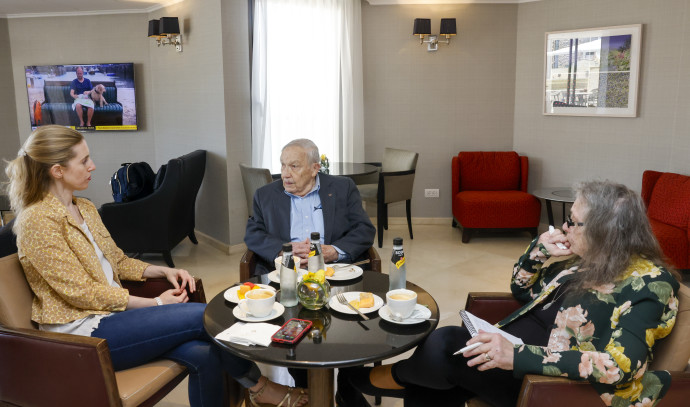Interview with Mordechai Palzur, Holocaust survivor and diplomat

Normally, this column involves one table. However, in service of grasping Mordechai Palzur’s full, colorful story in its entirety – complete with materials that included a miniature revolver and a touching letter from pope John Paul II – In Jerusalem met with the retired veteran diplomat for two conversations on two days in two hotels, first at the Inbal, then the King David,
Palzur, with his kind eyes and approachable manner, was eager to tell us every detail. We grouped our armchairs closely around him, listening intently.
First things first: Israel has not had a Polish ambassador since August 2021, even though an Israeli ambassador, Yaakov Livne, presented his credentials to Poland’s President Andrzej Duda in early July 2022. The Poles have said they will be sending an ambassador to Israel but have not said when.
Palzur pulls no punches and blames Yesh Atid leader Yair Lapid for the diplomatic imbalance. The Polish-born Palzur, set to celebrate his 95th birthday on July 22, was the first Israeli ambassador to Poland following the restoration of diplomatic relations between the countries after a two-decade post-Holocaust hiatus. All Soviet Bloc countries, except Romania, had severed diplomatic relations with Israel in the wake of the 1967 Six Day War.
Palzur was the first Israeli diplomat to have served behind the Iron Curtain since 1967.
Fast forward to 2021, when Poland enacted legislation setting a 30-year time limit on reclamation of property initially seized by the Nazis and later by the Communists.
The law was a general one and did not apply solely to Jews. Nonetheless, Israel took offense and Yair Lapid, foreign minister at the time, decided to downgrade diplomatic ties with Poland by recalling Israel’s ambassador. He also committed the cardinal diplomatic sin of advising then-Polish ambassador Marek Magierowski – who was on vacation – not to return to Israel. Poland’s Foreign Ministry took Lapid’s words to heart and sent Magierowski to Washington.
Foreign Ministry professionals in Israel were aghast and warned that Lapid’s undiplomatic decision could have far-reaching results. Asked recently why he thinks the Poles are taking their time in sending an ambassador to Israel despite accepting the credentials of the Israeli ambassador, Palzur exclaimed: “Lapid humiliated them. What he did was inexcusable!”
It was doubly so in the case of Magierowski, a first-class diplomat, Palzur explained, pro-Israel and pro-Jewish, with enormous empathy for Holocaust survivors, with whom he met frequently.
Polish beginnings
Palzur was born in Tarnow, in southeastern Poland, into a highly educated, well-to-do family. Both his parents were graduates of Krakow’s renowned Jagiellonian University, which dates back to 1364. His father was a professor there, in addition to being a captain in the Polish Army reserve forces.
Although there were several Jewish schools in Tarnow, Palzur’s parents opted to send him to a non-Jewish school. One interaction sticks out in his mind: The father of one of his classmates was also an army captain, and when he boasted of this, the young Palzur enthused that his father was as well. “Jews can’t be captains in the army,” the non-Jewish boy retorted.
Although Palzur has no recollection of physically abusive antisemitism at school, he remembers being called a “Jewboy.” Thus, when he became Israel’s top diplomatic representative to Poland, there was a certain triumph in landing there as the ambassador of the Jewish state and to present his credentials to Wojciech Jaruzelski, Poland’s last Communist leader.
While some Jews did succeed in attaining high positions in pre-Holocaust Poland, there was always an undercurrent of antisemitism. For instance, despite his father’s influential academic and military careers, when Palzur wanted to join the scouts, his application was rejected because he was Jewish. That is hardly surprising, considering that Robert Baden-Powell – the founder of the Boy Scouts, who to this day is considered to be the “Chief Scout” of the worldwide Boy Scout Movement – was a racist and an admirer of Mussolini and Hitler.
Tarnow takeover
Officially, Germany invaded Poland on September 1, 1939, but according to Palzur, it was August 28. That was the date on which the Germans blew up the Tarnow railway station, which was around 100 meters away from Palzur’s home. His father was immediately summoned for reserve duty. The Poles had an inkling that something of greater proportions was about to happen.
That particular episode in Polish history is not forgotten. A plaque at the railway station contains the names of all the casualties, including Jews, who before the Holocaust comprised some 40% of Tarnow’s population. Today, there are no Jews in Tarnow.
The Germans took over the city on September 8, 1939, exercising a gradual process of tyranny and murder. They captured Jews in the street and beat them up. Not much later, they began killing them. Then they started burning Jewish community buildings, including synagogues. After that, Jews were required to hand over all jewelry and foreign currency. Soon after, in March 1941, they were herded into a ghetto.
During this time, Palzur’s father sold a home they owned. The zloty had been devalued, so he asked to be paid in gold. It was this cache that saved the family from many a future predicament.
From there, many, including Palzur’s family, were deported to Krakow, from where they were later taken to Siberia by the Russians. They traveled by train via Ukraine. For days, the hapless passengers were packed like sardines into airless carriages with no toilet facilities.
Palzur transported us from our plush hotel surroundings to the primitive Siberian hard labor camp. Conditions were extremely harsh, the climate was unbearable, and disease was everywhere. Getting caught in quicksand was a danger. Palzur slept on the floor.
The Polish government-in-exile, headquartered in Britain, was initially very ill-disposed toward the Soviet Union, but because tens of thousands of people – both Jewish and non, including prisoners of war and refugees – were located on Soviet territory, it did not take long before the Polish government-in-exile reached an agreement with the Soviet government for the establishment of diplomatic ties. This led to permission for the formation of a Polish army on Soviet soil. There were certain rules for eligibility, and Jews qualified, though non-Jewish Poles resented their presence.
Among the Jews was a future prime minister of a future Jewish state – Menachem Begin, who was to take office a little over three decades later.
When Soviet ruler Joseph Stalin allowed many Poles, including Jews, to leave, they were nonplussed, not knowing where to go. So many places had names they’d never heard of and knew nothing about, and Google was not yet in existence. Palzur’s father took a map and tried to make an educated guess – southern countries would have warmer climes. Thus, dipping into their reserves, his father organized – with other camp residents – to purchase passage on an industrial train to a southern Soviet state.
They spent a few years there. The weather was not as mild as hoped.
Passage to Persia – and Palestine
Suprisingly, when viewed through a 2024 lens, large numbers of Jews at the time opted for Persia (today’s Iran) and discovered an infinitely preferable lifestyle to that which they had known in Siberia or elsewhere in the Soviet Union. Indoor toilets were luxuries they did not take for granted. Iran was experiencing a severe economic crisis at the time but gave a warm welcome to the thousands of Polish refugees who entered mainly via the port city of Pahlevi, now known as Anzali.
Gen. Wladyslaw Anders, commander of Polish military forces in the Soviet Union, evacuated 74,000 Polish troops, as well as civilians and a substantial number of children. Of these Polish evacuees, some 5,000-6,000 were Jewish.
Palzur’s family, arriving in Persia in 1942, was sent to a British army base, which meant Palzur didn’t have much contact with Jewish children. His father was recruited back into the army, but this time he wore a British uniform.
Economic crisis notwithstanding, Persia was a paradise compared to the deprivations suffered in the Soviet Union. Before arriving in Iran, the young Palzur had never been inside a coffee house. There, he accompanied his father to an establishment with tables and chairs and waiters bringing elegant trays of coffee and pastries to patrons. Palzur’s eyes widened in wonder at the comparative grandeur of what was probably an ordinary café.
Another eye-opener was in town. Palzur received a permit to leave camp, and for the first time since departing Tarnow, he saw shops – and was spellbound by their window displays. School, however, did not figure in.
While in the camp, his father became ill and was hospitalized. He was then discharged from the army but permitted to remain on base, where he opened an impromptu school in one of the hangars. He was joined by others on the base who were qualified teachers.
Tel Aviv was the final destination for Palzur’s family, but without a certificate of approval from the British authorities in charge of what was then Palestine, there was no way for them to gain entry.
One day a woman arrived from Palestine, saying she was a representative of the Jewish Agency. She made a list of names of those who wanted to go to the Holy Land, then disappeared for several weeks. When she showed up again, she was clutching the much sought-after certificates. Her name was Tzippora Sharett and she was the wife of Moshe Sharett, the man destined to become Israel’s second prime minister. This year is the 130th anniversary year of his birth.
Escorted by British warships, Palzur and his parents, along with other Jewish refugees, left Persia in December 1943 to Haifa. It was a dangerous voyage because there were Nazi U-boats in the area.
From Haifa, the family traveled by bus to the old central bus station in Tel Aviv, alighting late at night into darkness. There was no one around from whom they could ask directions. There were no taxis in the vicinity. It was a very different Tel Aviv from today’s sprawling, growing metropolis.
The family was fortunate in that security personnel came on patrol, took pity on the newcomers, and told them they could sleep in their office, which they unlocked.
The following day, Palzur’s father found a hotel near Tel Aviv’s center and rented a room there until, a few days later, he found a larger room in a more suitable hotel. The family lived in this room for three years. That hotel is still standing and hosts travelers on limited budgets.
Adapting
Palzur was enrolled in a nearby school, but he hadn’t been in a classroom for four years and was unable to follow the lessons since he didn’t understand Hebrew. It was really tough for the young adolescent, an especially bright boy whose grades were low, only because Hebrew bewildered him.
His father hired a private tutor to teach him Hebrew, but he still felt out of place. There was a non-Jewish Polish school on Montefiore Street, and it was there that Palzur caught up with all the schooling he had missed since leaving Tarnow.
He was also, finally, able to realize a childhood ambition: He joined the scouts. The scoutmaster was also a prominent member of the Hagana. Recognizing Palzur’s potential, he invited him to join. From the Hagana, where he became an expert shooter and engaged in several operations, it was only a brief step in time to find himself fighting in the War of Independence.
Palzur was wounded and spent a long stint in hospital. One day, he went to put on his boots and found a snake nestled in one; luckily, he hadn’t yet put them on and his healing continued unimpeded.
Security conscious as a result of his experiences, Palzur never goes anywhere unarmed. In the course of the interview in the busy Inbal business lounge, with those around us enjoying refreshments, he blithely pulled a small handgun from his pocket. We were momentarily amused, thinking it was a toy. But it wasn’t.
“Have you ever used it?” we asked.
“I haven’t killed anyone,” was the reply, which left us somewhat mystified, but he decided to keep us guessing.
Entering the diplomatic corps
Following his recovery, not long before being discharged from the army, Palzur went to a lecture by Walter Eytan, director-general of the nascent Foreign Affairs Ministry, then located in Tel Aviv. He asked Eytan if there were any job possibilities. When Eytan learned Palzur spoke multiple languages, he invited him to come to his office. After a brief chat, Eytan told human resources to hire Palzur due to his language prowess.
Following his release from military service in 1949, he joined the Foreign Ministry in 1950 but was briefly back in the army in 1967 when called to serve as a member of general staff during the Six Day War.
Israel’s founding prime minister David Ben-Gurion – though betrayed by his own Polish accent when speaking Hebrew – was gung-ho about Israelis shedding their Diaspora shackles by speaking Hebrew instead of Yiddish, and changing their names to Hebrew equivalents or some other Hebrew name that appealed to them. Thus, Goldberg became Har-Zahav, Zylber became Caspi, and Fogel became Zippori. Proper names were also changed. A Hebrew name was more common among females, unless it was a Yiddish version such as Sura, which became Sarah.
Palzur had no need to translate his name. His original surname was Plutzer, but Hebrew is a language in which the vowels are not written between the consonants – only underneath, if at all. Thus, the Hebrew letters in Plutzer and Palzur were the same.
When he began working at the Foreign Ministry, Palzur was surprised to see it was very orderly, with a lot of files on numerous subjects connected in one way or another with international relations, a subject he later studied at the Hebrew University Jerusalem, along with economics and political science. (He had previously studied law at the Tel Aviv School of Law, believing a diplomat should be familiar with as broad a range as possible of work-related subjects.)
In the Foreign Ministry’s early years, there was minimal training. It was a matter of learning on the job as one went along. New employees were told to read the files; seeing a need, Palzur put together a handbook for them.
With hindsight, Palzur attributes the initial orderliness to the fact that most early ministry employees were from abroad and had not come to Israel to be farmers on kibbutzim and moshavim. They were white-collar workers – academics, lawyers, scientists, accountants, and more, who saw it as a mission to win friends for Israel so the state could become integrated and accepted in the global community.
Other than secretarial staff, hardly anyone in the Foreign Ministry stayed in the same position for more than two or three years. Palzur quickly rose through the ranks, taking on a number of different positions before his elevation to the role of ambassador. All together, he now speaks eight languages and has held seven ambassadorial posts – the most important of which, for personal and professional reasons, was Poland.
On the ground in Warsaw
Long before that, in the first half of the 1970s, when Turkey invaded Cyprus, Palzur was in Cyprus as Israel’s chargé d’affaires. Israeli journalists who had gone to Cyprus to cover the war were caught in the crossfire between the two sides and in danger of losing their lives. Palzur’s intervention resulted in their rescue and a citation by foreign minister Yigal Allon.
Ultimately, his career would also span (in various capacities) Mexico, Pretoria, Bolivia, the Dominican Republic, Antigua and Barbuda, St. Kitts and Nevis, Trinidad and Tobago, and Barbados.
But his arrival in Warsaw in 1986 with the title of ambassador – even though full diplomatic relations had not been officially renewed between Israel and Poland – was an emotional experience.
While the restoration of diplomatic relations had been in the pipeline for some time, there had been no Israeli representation as such. Israel’s interests were represented by the Netherlands, with Dutch officials working out of the former Israeli embassy. The plaque at the entrance testified this was the Dutch Special Interests Office. It was still a special interests office during Palzur’s tenure, but the plaque was removed and replaced by another indicating that this was the Israeli Special Interests Office.
For all that, Palzur was permitted to present his credentials in a highly unusual gesture on Poland’s part – and a sign of its strong desire to renew diplomatic ties.
While in Poland, Palzur had little to do with the tiny Jewish communities, partially because the country was still under Communist rule and there was fear among the Jews about what might happen if they were seen consorting with the Israeli ambassador.
Before presenting credentials to the head of state, new ambassadors first visit the Foreign Ministry to present credentials to the chief of protocol and possibly the foreign minister. The Poles were not sure whether Palzur was the genuine article or a spy, so during his visit to the Foreign Ministry, a Tarnow resident was brought in to quiz him about the city. Though he had been only 10 when he left, Palzur remembered enough to satisfy officials that this was indeed where he came from.
A visit to his hometown was inevitable. Palzur was given a red carpet welcome, deeply ironic considering the circumstances under which he had left close to half a century earlier. The Poles are very good at keeping life-cycle data, and much had been preserved in many municipal basements of towns and cities that were severely damaged or destroyed.
The mayor of Tarnow wanted to show Palzur the record of his birth, but there was no Palzur in the book. Palzur explained the name change and told him to look under Plutzer. Sure enough, the registration of his birth was there, and the mayor was even more excited than Palzur to see it.
Making a lasting mark
During the four years he spent in Poland, Palzur set the wheels in motion for much of what is now taken for granted in Jerusalem-Warsaw relations, such as direct flights between the two countries by EL AL and LOT airlines.
The trickle of Jewish migration from the Soviet Union had begun to swell, and Palzur was able to arrange for many emigrants to travel via Poland to Vienna, from where they continued on to Israel, the US, Australia, and points elsewhere.
Prior to his retirement from the Foreign Service in 1994, Palzur spent four years as chief of state protocol, during which time he welcomed new ambassadors, heads of state and government, senior ministers, and other officials, often escorting them to meetings with Israeli counterparts and other high-ranking personnel. In this capacity, much of his time was spent in high-end hotels, where he met honorable visitors whom he accompanied, such as Mikhail Gorbachev (Palzur’s wife got along particularly well with Gorbachev’s wife, Raisa) and Margaret Thatcher.
During his period in Poland, Palzur had many dealings with Moshe Arens, then-foreign minister. Arens was well acquainted with billionaire businessman Shaul Eisenberg, who had a finger in many money-making pies, especially in China and Japan, and elsewhere in Asia and in Europe.
Eisenberg entertained many visiting foreign dignitaries at lunch or dinner but was never sure of the specific protocol for seating them. He used to consult with Palzur when the latter was serving as chief of protocol, and a certain bond formed between them.
The next chapter
Following Palzur’s retirement, Eisenberg invited him to lunch and asked what he would be doing next. Palzur replied that he hadn’t really thought about it. Eisenberg offered him a job, which Palzur politely declined, explaining he knew nothing about business.
“I’ll teach you!” exclaimed Eisenberg, who in the next breath said no one had ever told him this before, that they didn’t know something. They pretended to know, even when they were completely ignorant.
Instead of setting Palzur up in an office of his own, Eisenberg placed a chair at the end of his own very long desk, where Palzur was a daily witness to Eisenberg’s outbursts of rage. A volatile man, he did not hesitate to shout and hurl insults at employees with whom he found fault. In the little over three years he spent with Eisenberg, Palzur learned a lot and found the experience fascinating, but it took a toll on his health. His blood pressure rose, and his doctor warned him this could cost him his life – so he left.
Like many retired diplomats, Palzur did not sever his contacts with the Foreign Ministry, and in 2008 he authored a book on being a diplomat in Israel. It was published by the Foreign Ministry and serves as a guideline for all incoming diplomatic representatives of foreign countries.
Some ambassadors maintain contact with the countries in which they served. Others take a “been there, done that” attitude, and once they leave, those countries are little more than an item on their CVs. In Palzur’s case, he was invited back to Poland to participate in conferences and remains on the guest lists of the Polish Embassy and the Polish Institute in Israel. He also watches Polish television. Other than that, he is closely affiliated with the World Jewish Congress and the Israel Council on Foreign Relations, each of which has a certain interest in Poland.
Notwithstanding his age, Palzur is spry, independent and continues to drive his car wherever he needs to go.
Though not common knowledge, Palzur had been well aware that pope John Paul II (who served from 1978-2005) was involved in helping Jews find shelter during the Holocaust, and he wanted to give him something meaningful from the Jewish state.
He was able to acquire an ancient crucifix in Jerusalem, and then as the ambassador of Israel in Poland, traveled officially to the Vatican to present the gift to the first-ever Polish pope.
We concluded our second interview – and our long, meaningful visit to the far-flung past– with Palzur showing us the letter he received from the pope. John Paul II was extremely moved to receive a cross from Jerusalem, from a Holocaust survivor representing the revival of the Children of Israel.■





